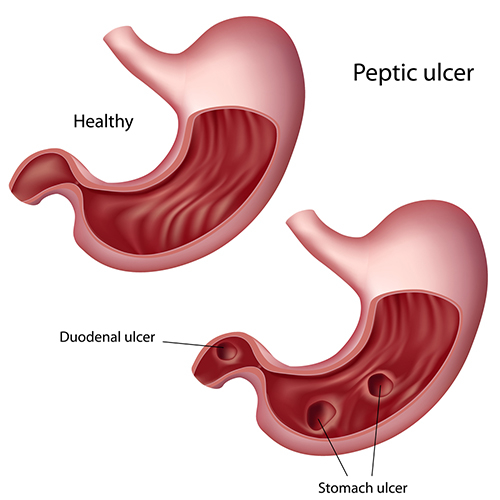What is a duodenal ulcer?
Duodenal ulcers are a common cause of abdominal pain. Once treated, they usually get better in a matter of weeks.
A duodenal ulcer is a sore that forms in the lining of the duodenum. Your duodenum is the first part of your small intestine. This is the part of your digestive system that food travels through, after it leaves your stomach.
You can get an ulcer in your stomach as well as in your duodenum. Stomach ulcers and duodenal ulcers are both types of peptic ulcers. If you have either of these, you have what’s called ‘peptic ulcer disease’.

What causes duodenal ulcers?
Your stomach makes a strong acid that helps you digest food and kills germs. The cells of the stomach and duodenum make a barrier from mucus, to protect themselves against this acid. If the mucus barrier is damaged, an ulcer can form.
The main cause of this damage is infection with bacteria called Helicobacter pylori, or H. pylori. The bacteria can cause the lining of your duodenum to become inflamed and an ulcer can form.
Some medications can also cause duodenal ulcers, particularly anti-inflammatory medicines such as ibuprofen and aspirin. It is rare that other medicines or medical conditions cause an ulcer.
There are some lifestyle factors that may make you more likely to get a duodenal ulcer, such as:
- smoking
- drinking a lot of alcohol
- experiencing stress
However, these things are less important than infection with H. pylori.
What are the symptoms of a duodenal ulcer?
If you have a duodenal ulcer, you might:
- have pain in your stomach or abdomen
- have indigestion
- feel very full and bloated after eating
- feel like you might vomit (nauseous)
- lose weight
Your stomach pain may come and go. It can often be relieved by eating or taking an antacid.
Very occasionally, an ulcer can cause serious complications. Go to the emergency department if:
- you have a sharp pain in your stomach that doesn’t go away
- your vomit or stools (poo) look bloody or a black colour
If you are concerned about symptoms, you can use healthdirect’s online Symptom Checker. This can give you advice on the next appropriate healthcare steps and when to seek medical attention.
How are duodenal ulcers diagnosed?
To diagnose a duodenal ulcer, your doctor will talk to you and examine you. They will probably also run some tests to find out if you have a H. pylori in your body. These tests may include:
- a blood test
- a stool (poo) sample
- a breath test
Your doctor may also conduct a gastroscopy. This is also called an endoscopy.
A specialist doctor uses a thin, flexible tube with a camera on the end to look inside your stomach and duodenum. If you have a gastroscopy, your surgeon might take a sample of tissue (a biopsy) to test for H. pylori.
How are duodenal ulcers treated?
If your ulcer is caused by H pylori, the usual treatment is ‘triple therapy’. This involves taking 2 antibiotics and a medicine. The antibiotics kill the bacteria, while the medicine reduces the acid made by your stomach.
If you don’t have an H. pylori infection, and you have been using anti-inflammatory drugs, you will need to stop taking them (if possible). You will also need to start taking a drug to reduce the acid production in your stomach.
You can make some other changes to improve your symptoms, such as:
- taking antacids
- drinking less alcohol
- losing weight if you are overweight
- quitting smoking
Relief can also come by reducing your intake of:
- hot drinks
- fatty foods
- spicy foods
- acidic foods (such as tomato)
Can duodenal ulcers be prevented?
H. pylori is often present in childhood, but adults can also be infected. Practicing good hygiene can help prevent infection.
What are the complications of duodenal ulcers?
If left untreated, your duodenal ulcers may get worse. This can cause other complications, such as:
- broken blood vessels (haemorrhage)
- obstructing food from leaving your stomach
- perforation (creating a hole) in the duodenal wall
These complications require emergency treatment, and can cause sharp pain, bloody vomit, or bloody faeces (poo).

